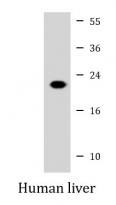ARG55770
anti-BLVRB antibody
anti-BLVRB antibody for Western blot and Human,Mouse
Overview
| Product Description | Rabbit Polyclonal antibody recognizes BLVRB |
|---|---|
| Tested Reactivity | Hu, Ms |
| Tested Application | WB |
| Host | Rabbit |
| Clonality | Polyclonal |
| Isotype | IgG |
| Target Name | BLVRB |
| Antigen Species | Human |
| Immunogen | KLH-conjugated synthetic peptide corresponding to aa. 161-175 (C-terminus) of Human BLVRB. |
| Conjugation | Un-conjugated |
| Alternate Names | FLR; BVRB; SDR43U1; HEL-S-10; Flavin reductase (NADPH); FR; EC 1.5.1.30; Biliverdin reductase B; BVR-B; EC 1.3.1.24; Biliverdin-IX beta-reductase; Green heme-binding protein; GHBP; NADPH-dependent diaphorase; NADPH-flavin reductase; FLR |
Application Instructions
| Application Suggestion |
|
||||
|---|---|---|---|---|---|
| Application Note | * The dilutions indicate recommended starting dilutions and the optimal dilutions or concentrations should be determined by the scientist. | ||||
| Positive Control | Human liver |
Properties
| Form | Liquid |
|---|---|
| Purification | Purification with Protein A and immunogen peptide. |
| Buffer | PBS and 0.09% (W/V) sodium azide. |
| Preservative | 0.09% (W/V) sodium azide. |
| Storage Instruction | For continuous use, store undiluted antibody at 2-8°C for up to a week. For long-term storage, aliquot and store at -20°C or below. Storage in frost free freezers is not recommended. Avoid repeated freeze/thaw cycles. Suggest spin the vial prior to opening. The antibody solution should be gently mixed before use. |
| Note | For laboratory research only, not for drug, diagnostic or other use. |
Bioinformation
| Database Links | |
|---|---|
| Gene Symbol | BLVRB |
| Gene Full Name | biliverdin reductase B |
| Background | The final step in heme metabolism in mammals is catalyzed by the cytosolic biliverdin reductase enzymes A and B (EC 1.3.1.24).[supplied by OMIM, Jul 2009] |
| Function | Broad specificity oxidoreductase that catalyzes the NADPH-dependent reduction of a variety of flavins, such as riboflavin, FAD or FMN, biliverdins, methemoglobin and PQQ (pyrroloquinoline quinone). Contributes to heme catabolism and metabolizes linear tetrapyrroles. Can also reduce the complexed Fe(3+) iron to Fe(2+) in the presence of FMN and NADPH. In the liver, converts biliverdin to bilirubin. [UniProt] |
| Cellular Localization | Cytoplasm. |
| Calculated MW | 22 kDa |
Images (1) Click the Picture to Zoom In






